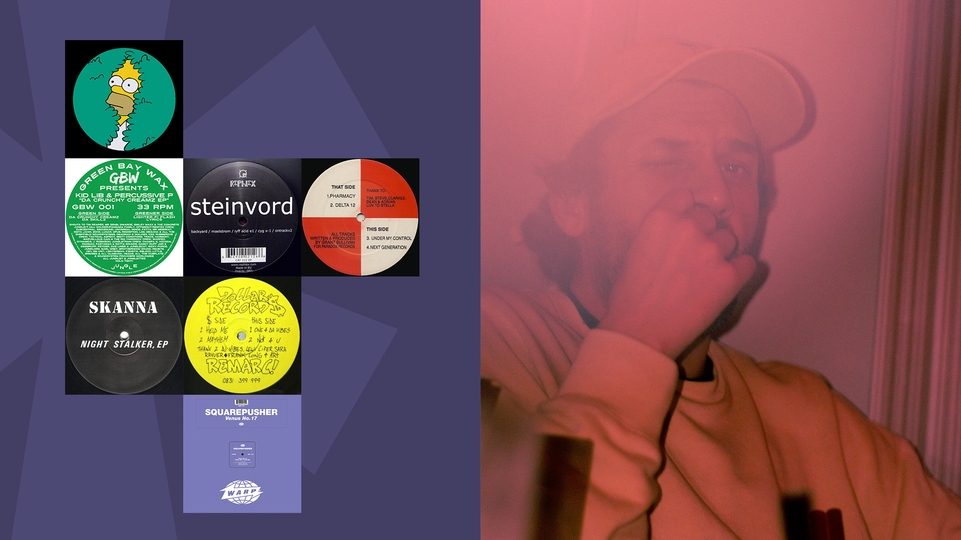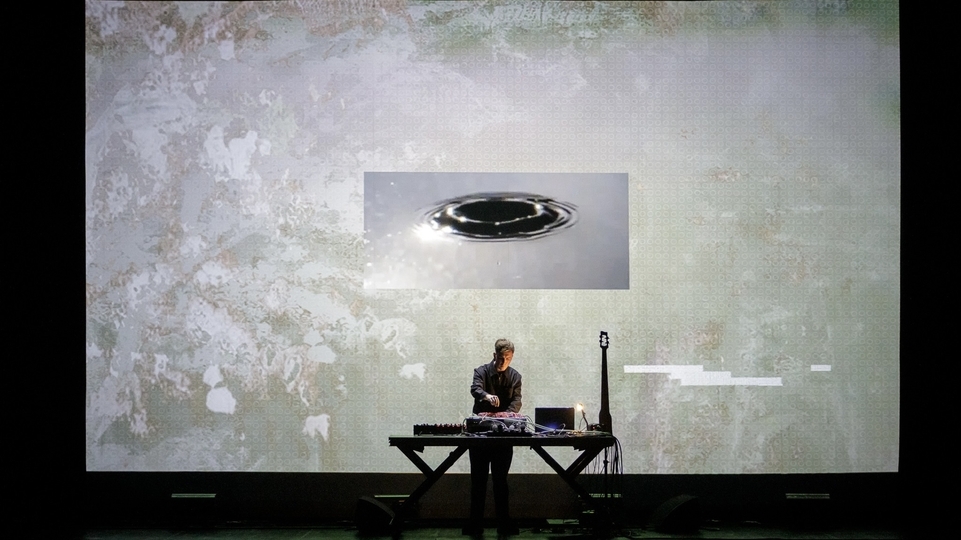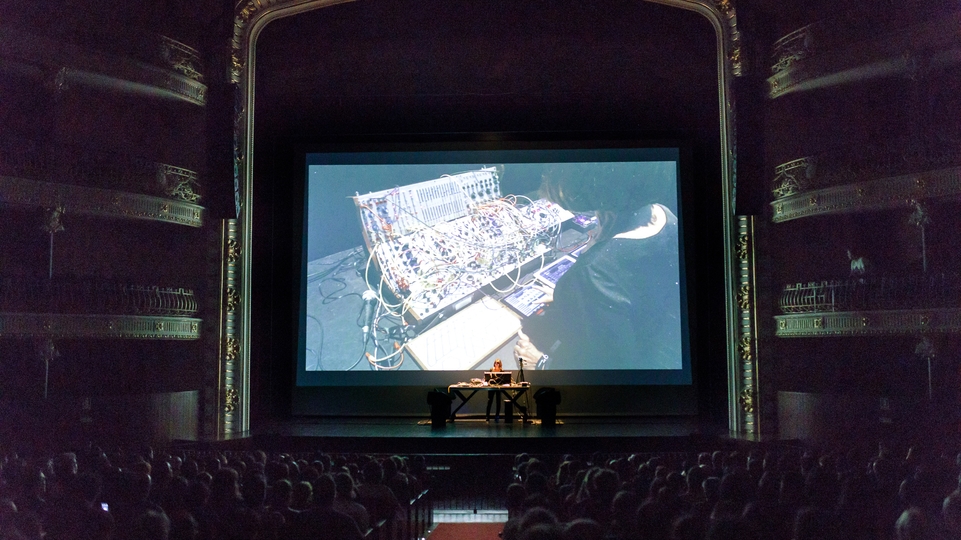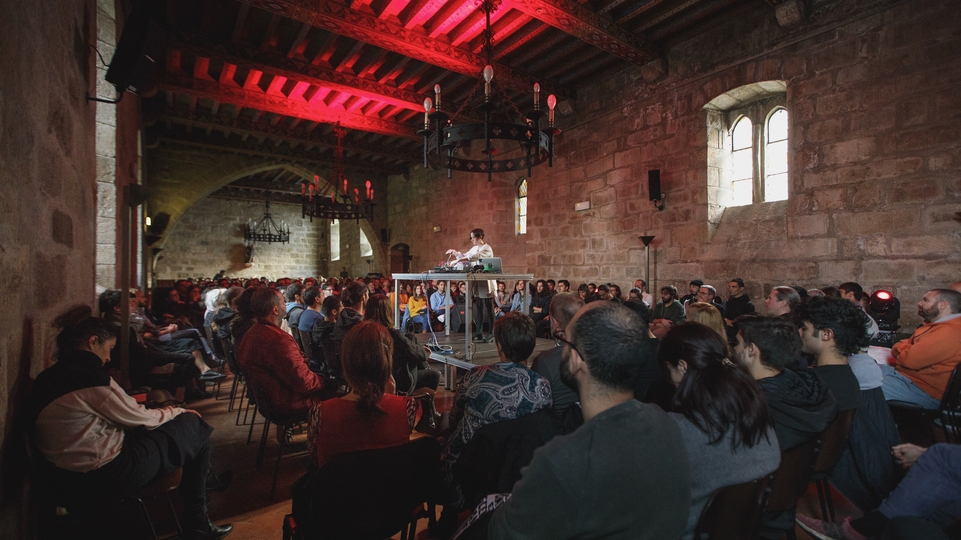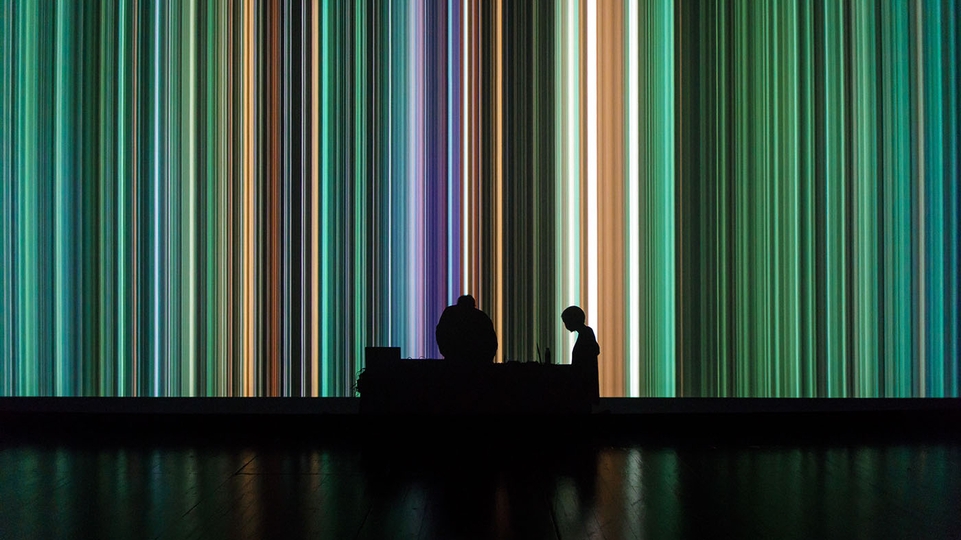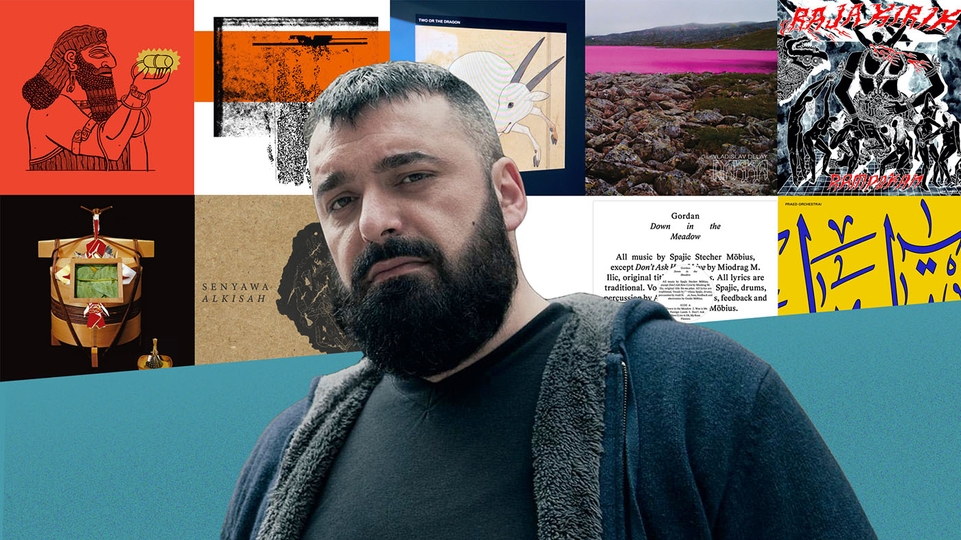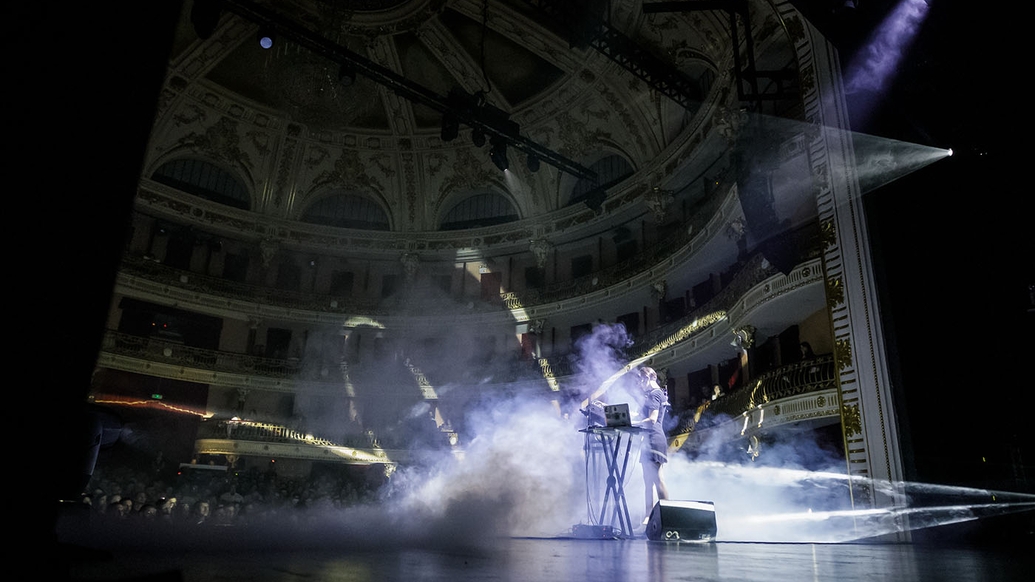
Sonic synergy: Portugal’s Semibreve Festival celebrates the magic of contrast
With a carefully curated line-up of adventurous electronic music, Semibreve Festival’s 12th edition delights in the interplay between hyper-detailed electronics and dancefloor-focused beats
The late, great Peter Rehberg, musician and founder of the experimental electronic music label Editions Mego once said: “If you want to make something noisy, you have to make something that is harmonic as well. Dissonance and resonance have to co-exist for the other to work.”
Walking through the cobbled streets of Braga, a small historic city in northwest Portugal, on the weekend of Semibreve Festival’s 12th edition, these words echo with a particular poignancy. Over four days of carefully curated music and digital art, the annual event lives up to its reputation for making every sound count, but pushes this idea to new extremes with performances that encompass everything from bone-rattling drones and elasticated club experiments to microscopic musique concréte and mesmerising minimalism. The result is a masterclass in sonic synergy, where painterly details interact with immense volume, where blinding distortion collides with animated vibrancy, and melody meets brutality to genuinely thrilling effect.
There’s a storm brewing on Friday night. Distant flashes of lightning precede low rumbles of thunder as we make our way into the stunning, gilded hall of the city’s Theatro Circo for the first performance of the evening, courtesy of KMRU. The Berlin-based, Kenyan sound artist, whose breakthrough came in 2020 after the release of his album ‘Peel’ on Editions Mego, makes music that is concerned with the act of listening as an artform in itself. His releases are tapestries of finely-tuned field recordings and deep, meditative ambience, though a recent collaborative album with Parisian artist Aho Ssan demonstrated his ability to turn these precise sound designs into tectonically intense compositions. His set tonight moves further into this territory; standing under a flickering orange spotlight, in front of slowly morphing black and white projections, he plunges the ornate space into a deep, distorted reverie. Relentless bass drones roar at a teeth-shaking volume; it’s hard not to feel a little concerned for the wellbeing of the chandelier above us as seats shake and walls hum under the vibrational pressure.
It’s colossal music, standing in stark contrast to Thursday’s opening concert, which saw Felicia Atkinson and Violeta Azevedo play a potently subtle set at the Santuário Do Bom Jesus Do Monte, a hilltop Catholic shrine that looms over the city. While their performance harnessed the hypnotic potential of delicate sound, KMRU’s is an eruption of audio as a physical entity. A thread exists between them however, in the minute details that emerge from beneath the noise: zaps of birdsong creep into the mix as lights begin to strobe, reminding us that his music is a living, breathing thing that rewards attentive listening, even at its most visceral.
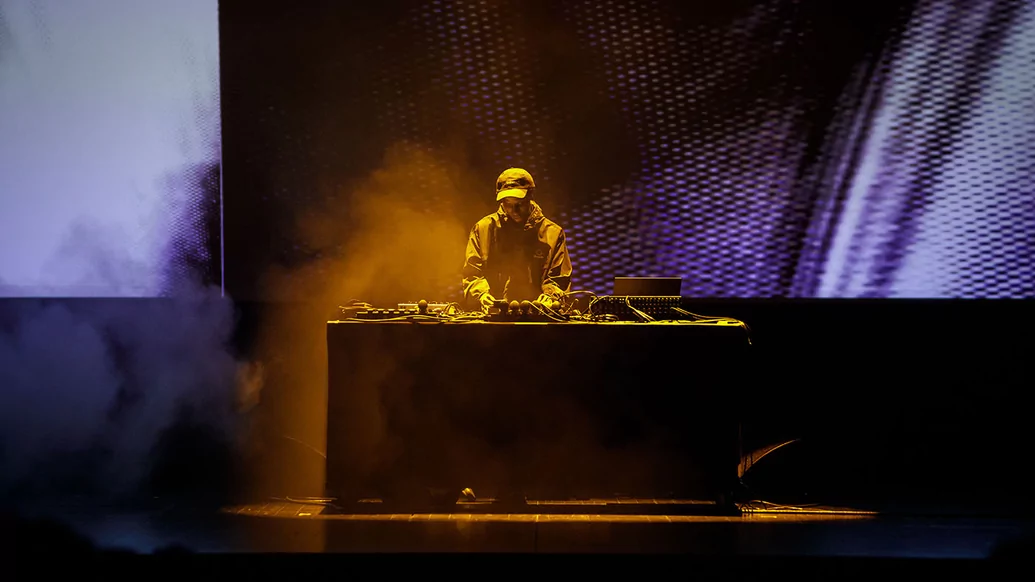
After a quick breather, Sunn O)))’s Stephen O’Malley and François J. Bonnet, director of the INA-GRM electro-acoustic music institute in Paris, take to the Theatro Circo stage with a near-ceremonial performance that melds sparse and echoing electronics with the former’s trademark guitar drones. Some hours before, at the GNRation arts and culture centre, the pair shed light on their collaborative partnership as part of a talk with Bartolomé Sanson, co-founder of the Shelter Press record label/publishing platform alongside Atkinson. As they discuss their album, ‘Cylene’, released on Editions Mego in 2019, Peter Rehberg’s influence feels palpable; his reflections on resonance and dissonance ring true in Bonnet’s soft-focus tones and the low-end growls of O’Malley’s Travis Bean. It builds and builds into an epic exercise in deconstructed doom metal – a compelling demonstration of slow and steady majesty.
There’s nothing slow or steady about Gábor Lázár’s set over in GNRation. The Hungarian artist, who released the album ‘Boundary Object’ via Planet Mu earlier this year, kicks off the festival’s club programme with a stimulating live set of synapse-snapping beats. Synthetic kicks and cyborg swoops lock the audience into an implausible step. It’s wild, bracing stuff, but there is a magnetism to it; as silky synth pads converse with the jolting rhythms and red strobe light, it’s impossible not to feel completely transfixed. It tees the crowd up for DJ sets from Chicago’s Jana Rush (another Planet Mu affiliate) and Lisbon’s BLEID, who maintain a supercharged dancefloor energy deep into the night. The storm feels closer as we make our way through the city’s empty streets afterwards, the silence punctuated by sharp cracks of thunder.
The next day, after Malcolm Pardon’s performance of Cluster-like Kosmische and spellbinding piano compositions in the beautiful Capela Imaculada do Seminário Menor, we return to the Theatro Circo for a collaborative A/V set courtesy of composer Maxwell Sterling and visual artist Stephen McLaughlin. Weaving through dynamic peaks and troughs, the performance comprises tracks from Sterling’s ‘Turn Of Phrase’ and ‘Distance On Ground’ albums. Double bass hums and high-def electronics give way to bubbling rushes of melody and racing rhythms. At points it invokes the most exhilarating chapters of Oneohtrix Point Never’s catalogue, while at others it takes on a more gentle timbre with the recorded words of poet Leslie Winer echoing over gorgeous synths and choral glitches. McLaughlin’s live visuals, projected on the massive screen behind Sterling, match the pace of the music, leaping through visual themes and images with a fever dream intensity.
The intensity remains in Alva Noto’s set. The German glitch/minimal techno artist plays a galloping set in the Theatro Circo in front of luminous, oscillating visuals. Moments of total silence give way to blasts of brutal rhythm, turning the grandiose space into something more like a peak-time rave for just over an hour.
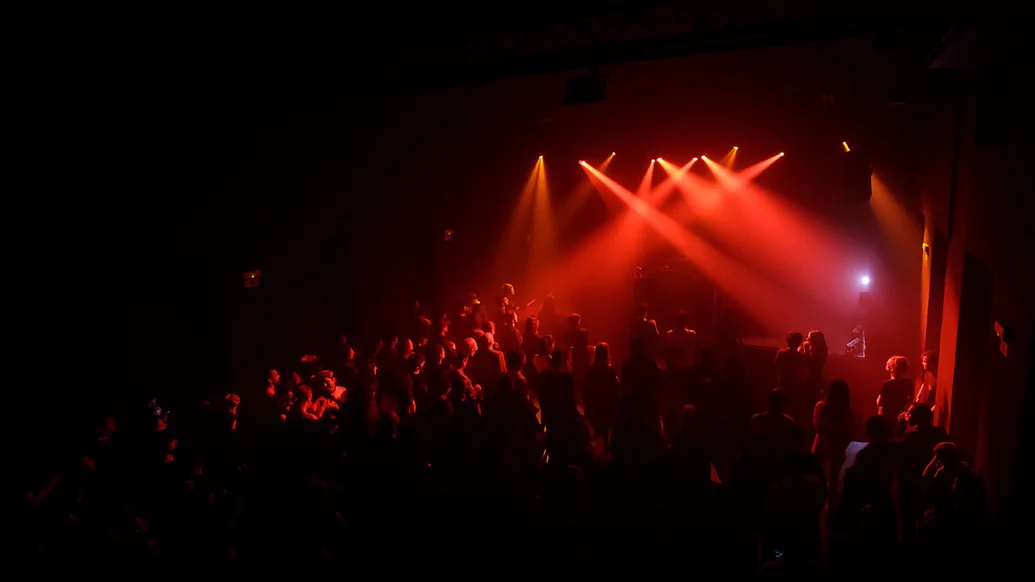
Our ears need a reset, and receive it in the Theatro’s small auditorium space shortly after midnight, courtesy of Ben Vida & Lea Bertucci. The New York duo perform an enchantingly strange interpretation of their recent album ‘Murmurations’, packed with FX-scrambled spoken passages, burbling modular synths and saxophone sighs. It’s a playful and tactile take on minimalism; an improvised celebration of conversational gibberish and subtle sound work. After the intensity of the night’s earlier performances, it’s a palette-cleanser, and another example of Semibreve’s delightfully contrasting programme.
At GNRation, Lisbon’s trailblazing Príncipe Discos collective demonstrates precisely how it has become the benchmark for Portugal’s most exciting musical movement. Emerging talent Xexa begins the showcase, before DJ Mardox and DJ Kolt bring the infectious momentum of kuduro to the dancefloor for a night of non-stop energy.
That sense of joyful club ceremony lingers in our bones as we take a seat in the Salão Medieval da Reitoria da Universidade do Minho for Jan Jelinek’s set on Sunday. Stood in the centre of the space, his hypnotising set of otherworldly musique concrète and ambience soothes the mind ahead of the closing performances at the Theatro Circo. Caterina Barbieri’s music feels made for a space like this; there is a sense of theatricality in the Italian artist’s arm gestures as she performs, as if she’s summoning her euphoric synth compositions from the earth itself. ‘Fantas’, the stunning opening track from her 2019 album ‘Ecstatic Computation’ sounds enormous with added vocals; its arpeggios ripple through the smoke-filled room with a resonance that feels close to divine.
Next to the closing performance by Burnt Friedman & Drumming GP, a specially commissioned collaboration by Semibreve, it brings to an end a festival that delights in the polarity of light and shade, of harmony and dissonance, and the magic that’s conjured when these sounds co-exist so perfectly.

